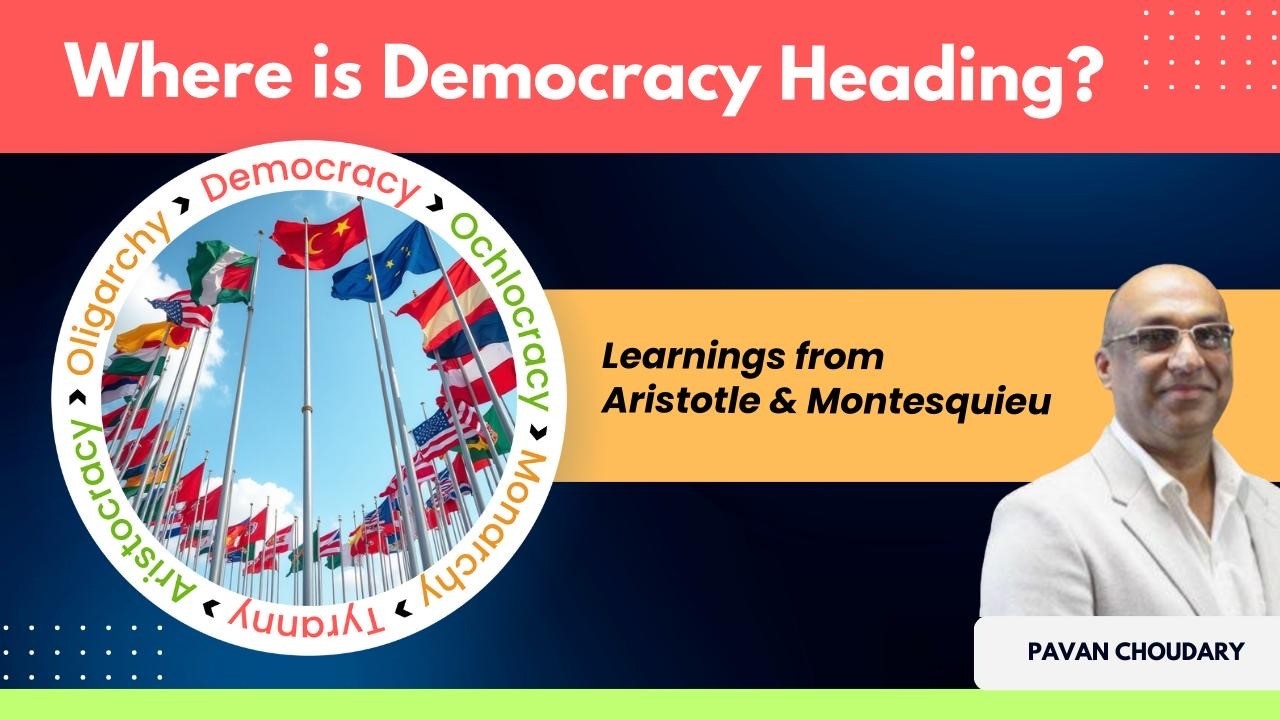 From ancient Greece to modern-day politics, the fate of governments follows a cycle that philosophers have long recognized. Aristotle described a cyclical theory of political change—later termed Anacyclosis by Polybius—in which forms of government follow a recurring sequence of rise, decline, and replacement. Montesquieu, writing centuries later, warned that extreme equality could erode institutions and lead to authoritarianism.
From ancient Greece to modern-day politics, the fate of governments follows a cycle that philosophers have long recognized. Aristotle described a cyclical theory of political change—later termed Anacyclosis by Polybius—in which forms of government follow a recurring sequence of rise, decline, and replacement. Montesquieu, writing centuries later, warned that extreme equality could erode institutions and lead to authoritarianism.
Today, these warnings feel more urgent than ever. The rise of populism, digital tribalism, and political polarization suggests that liberal democracy may be entering a critical phase—one where its foundations are tested as never before. The question is whether democracies can correct course before history repeats itself.
What is Anacyclosis?
Aristotle’s study of more than 150 states made him conclude that political systems follow predictable and repetitive cycle of rise, corruption, and renewal. No form of governance is permanent; power naturally evolves, degenerates, and transforms over time. The cycle generally unfolds like this:

In modern terms, this theory warns about how unchecked power — whether in the hands of one person, a group, or the masses — can corrupt any form of government.
It suggests the need for balance, accountability, and institutional safeguards to prevent the degeneration of political systems.
Are we now witnessing the later phase of this cycle for democracy? The rise of viral outrage, social media-driven politics, and mass protest movements suggest a growing instability in democratic systems. In many nations, trust in institutions has eroded, expertise is dismissed as elitist, and governance is increasingly shaped by reactionary populism rather than long-term strategy.
Let us come to the latest variant of democracy, Liberal Democracy.
Other than warning against extreme equality Montesquieu also warned against extreme liberty.
Writing in the 18th century, Montesquieu argued that a healthy democracy depends on a fundamental balance that all citizens are equal before the law but still respect institutions, hierarchy, and merit.
He also cautioned that when the pursuit of equality is pushed to an extreme, it can foster a deep distrust of authority itself—fueling the belief that no one should wield more power or privilege than another. Taken to its logical end, this mindset risks slipping into anarchy, where governance unravels because leadership is no longer seen as legitimate. The signs of such erosion are increasingly visible in today’s world where Judges are subjected to online harassment and political pressure, Teachers face mounting challenges in maintaining discipline in classrooms and Expertise—whether scientific or political—is often dismissed as out-of-touch or elitist.
Like Aristotle, Montesquieu feared that when authority is undermined to the extreme, democracy does not produce more freedom—it breeds anarchy. And history suggests that anarchy rarely lasts; exhausted populations eventually turn to authoritarian personalities who promise to restore order even if despotically. This was a concern echoed by Hobbes too, who believed that without a strong central authority, life would descend into a state of nature marked by chaos and violence.
So three great thinkers argue that radical egalitarianism undermines social structures—whether in politics, institutions, or even workplaces—eventually leading to authoritarian responses.
Montesquieu defined liberty as the ability to do what the law permits, rather than unrestricted freedom or licence to do or say whatever one wants. His conclusion was moderate equality fosters stability and freedom but extreme equality breeds disorder which invites autocracy.
His ideas on liberty and equality greatly influenced the French Revolution, but he would have likely been critical of how the French Revolution, which began with calls for liberty and equality, spiralled into mob rule and guillotinings and culminated in Napoleon’s dictatorship.
The Weimar Republic in 1920s Germany was an ambitious experiment in liberal democracy, but it ultimately collapsed amid political and economic turmoil—paving the way for Hitler’s rise to power.
Even today – as a reaction to excessive freedom and equality – we witness the strong resurgence of the illiberal strain within democracies.
The Rise of Strongman Politics: A Backlash Against Chaos created by an over-liberal and over-egalitarian democracy?
Amid this growing instability, a pattern is emerging: the rise of populist, nationalist, and authoritarian leaders who promise to restore order in the face of perceived democratic chaos.
Consider the rhetoric of leaders like Donald Trump, Xi Jinping, and Vladimir Putin—figures who differ ideologically yet converge on a shared narrative: a rejection of perceived liberal overreach and a reinforcement of traditional norms. In the United States, Trump has championed a return to conventional values, frequently criticizing progressive stances such as the recognition of a fluid gender spectrum. In China, Xi Jinping has led a campaign against what state media termed “soft masculinity,” promoting stricter, state-defined gender roles in popular culture. Meanwhile, in Russia, Vladimir Putin dismissed environmental activist Greta Thunberg’s impassioned appeals, suggesting it was inappropriate for a teenager to lecture world leaders on global policy.
Regardless of whether one agrees with them, their popularity reflects a deeper trend: a global reaction against liberal excesses and extreme egalitarianism. In many ways, their rise mirrors the historical cycles Aristotle and Montesquieu warned about.
The future of liberal democracy is not yet written. But these strong men are writing the latest.
-Pavan Choudary
If you wish to watch/hear the gist of this piece on Youtube please click on the link below. Thanks.